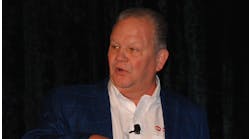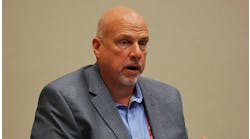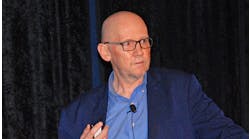There’s a longstanding belief that sustainability and productivity are at odds. You want to operate in a sustainable fashion? Great. It’s gonna hurt your productivity.
But society and shareholders and customers are demanding that manufacturers change this misconception. (Customers, for one, are expressing their commitment to sustainably produced products with their wallets.) And new technologies, empowered by the proper utilization of data, are enabling industrial enterprises to maintain that balanced approach. Sustainable practices. Productive operations. Win. Win.
“We at Rockwell take this approach internally and externally,” said Tom O’Reilly, Rockwell Automation vice president of sustainability, at a media briefing at this week’s Automation Fair, referencing how the company maintains this mindset in their own production processes, and how their solutions enable Rockwell Automation customers to do the same at their respective facilities.
Added Arvind Rao, the company’s global director and head of product management and industry solutions, “I am excited that sustainability is so important. Monitoring and managing energy is not new, but we’re taking a different approach these days—putting the smarts into smart devices to better report on energy consumption.”
So why now? It’s been a long time building, frankly. O’Reilly notes that Rockwell Automation has been spearheading sustainability programs for twenty years. But things have changed globally. There is more pressing demand, of course. (Just read a newspaper.) Investment funds like BlackRock are now rating companies on their sustainability efforts. The aforementioned customer demand for sustainably produced products increases daily. And, as the speakers noted, more Fortune 500 companies have now publicly declared net-zero goals for carbon emissions. Said O’Reilly, “We’re in an environment where manufacturing is getting more serious about addressing these issues.”
These issues are part of the motivation for Rockwell Automation’s comprehensive sustainable strategy, which is divided into three parts:
Sustainable customers: Enable our customers to achieve their own sustainability goals, making a positive impact on the world. Everything we do for our customers is about increasing efficiency, reducing energy usage, improving worker safety and ensuring regulatory compliance.
Sustainable company: Create innovative, sustainable products and solutions, and foster a culture that empowers employees to operate safely, sustainably and responsibly. Our commitment to ethics and integrity is a competitive advantage and a way to differentiate ourselves to our customers, partners, shareholders and employees.
Sustainable community: Support the communities in which we live and work, leaving a legacy that extends beyond our own organization. Our mission is to provide our community partners with access to resources that enhance productivity and sustainability.
And that strategy comes to life in myriad ways of helping the company’s business-to-business customers adopt elements of circular economy, such as implementing ways to recycle heat from industrial boilers and stacks to leverage it back into the manufacturing process; considering product sustainability during the design stage of products; leveraging data to boost compatibility between sites; benchmarking their performance against one another to drive new efficiencies; and adopting smart recycling and re-manufactuing programs, going so far as to bringing outdated Rockwell Automation products back up to spec with remodifications, affording new life to old assets.
It’s not always simple. It’s increasingly important. Prompted by a question from the audience about common barriers to sustainable manufacturing processes, O’Reilly responded that many executives simply don’t know where to start. “That’s part of the reason Rockwell has partnered with Kalypso, which has a unique methodology about where to start to drive sustainability and find real value.”
The presenters stressed that the marriage of sustainability and productivity is not just about technology. Most customers need an end-to-end look, they explained, with full consulting services to run their facilities—smarter—based on a load balance of power consumption, smart distribution of energy and the integration of renewable programs.
“Let me give you an example. We’re seeing manufacturing companies with their own wind farms,” marveled O’Reilly. “And they are looking for guidance on how to best tap into that power or contribute it to power the grid.”
That’s awfully smart. And really sustainable.
The editors of Control, Control Design and Smart Industry are reporting live from Automation Fair. When the event comes to a close, the editors will compile a report of the best, most important coverage from the event. Register now to pre-order the report and be among the first to receive it in your inbox. Pre-order your copy now.




